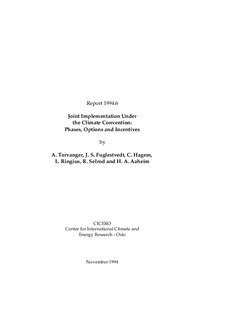Joint Implementation under the Climate Convention: Phases, options and incentives
Torvanger, Asbjørn; Fuglestvedt, Jan S.; Hagem, Cathrine; Ringius, Lasse; Selrod, Rolf; Aaheim, H. Asbjørn
Research report
Permanent lenke
http://hdl.handle.net/11250/191912Utgivelsesdato
1994Metadata
Vis full innførselSamlinger
- CICERO Reports [210]
Sammendrag
The aim of this report is to analyze the conditions under which Joint Implementation (JI) can contribute to a costeffective abatement of global greenhouse gas (GHG) emissions. JI refers to policies and measures implemented jointly by Parties to reduce net GHG emissions contributing to meeting their national commitment under the Climate Convention. The overall conclusion is that JI is a promising mechanism under some circumstances. Difficulties related to implementation and control of JI projects vary considerably and depend on what countries participate, how the project affects GHG emissions or sinks (for example through fossil fuel saving or through carbon sequestration in forests), and the institutional frames for JI.
The Conference of the Parties (COP) to the Climate Convention should take steps to establish the institutional capacity necessary to initiate and coordinate a number of studies and pilot projects in regard to JI. The potential problems related to implementation and control of the simplest JI project type are also found for the more complicated JI project types. Thus extra effort should be put into solving these basic issues. Contracts between JI parties should include incentives for the host country to implement the project in an efficient manner. Contracts can reduce some of the problems that may lead to a reduced cost saving potential and difficulties in controlling the global GHG abatement effect of JI projects. The establishment of a Clearinghouse or Credits Bank institution may significantly reduce some of the potential problems related to implementation and control of JI projects. These problems include asymmetric information and incentives that generate inefficiencies, the difficulties involved in measuring the global abatement effect of a JI project, and handling of risk related to uncertain cost per unit of GHG abatement.
